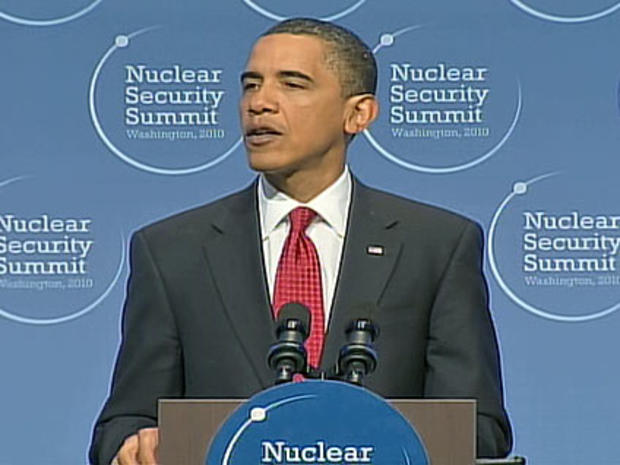Obama: We've Made the World Safer
President Obama hailed the advances made at the Nuclear Security Summit Tuesday afternoon, saying countries around the world had come together to make "real progress in building a safer world."
He said the world leaders at the summit had opted for "candor" and largely eschewed "long speeches about what other nations must do," instead committing to "meaningful steps that they are prepared to implement right now."
At the end of the two-day, 47 nation summit in Washington, the president said countries had agreed to work to reduce nuclear weapons stockpiles and proliferation and ensure that all nations have access to peaceful nuclear energy.
Mr. Obama said he was particularly pleased that the nations gathered for the summit endorsed his plan to secure vulnerable nuclear materials within four years, a plan he acknowledged was ambitious but which he said "can be achieved."
The president cited examples of progress at the summit, including moves by Canada and Chile to give up highly-enriched uranium and steps taken by Mexico, Argentina, Pakistan, Russia and other countries.
But pressed by CBS News' Bill Plante, he also acknowledged that there was no enforcement mechanism to the communique that came out of the conference. (PDF)
There is "no one world law enforcement mechanism," the president said, noting that "we never have" had such a thing.
"We're relying on goodwill by those who are signatories to those efforts," he said. "That's the nature of international relations." He said he believes world leaders "take their commitments very seriously."
The president said he was encouraged that "we've already seen efforts that had been delayed for years, in some cases since the end of the cold war, actually come into fruition at the end of this summit."
"For about ten years, we had been encouraging Ukraine to either ship out its highly enriched uranium or transform it to a lower enriched uranium," he said. "And in part because of this conference, Ukraine took this step. So all the commitments that we talked abut are ones that we've already booked, even before the work plan and the communique gets put into place."
The president said all nations had "agreed on the urgency and seriousness of the threat" and that they would work to strengthen the role played in stemming nuclear proliferation by United Nations and the International Atomic Energy Agency.
Asked about sanctions against Iran, the president declined to set a timetable but said "I want to see us move forward boldly and quickly to send the kind of message that will allow Iran to make a different calculation" when it comes to their nuclear program. He said he was confident China would join in pressing for sanctions against Iran, stating, "Words have to mean something. There have to be some consequences."
Asked if Israel's decision not to sign the Nuclear Non-Proliferation Treaty would lead other countries to follow suit, the president said "I'm not going to comment on their program."
"What I am going to point to is the fact that consistently we have urged all countries to become members of the NPT," he said. "So there is no contradiction there. We think it is important that we have an international approach that is universal."
On Pakistan, the president rejected one questioner's suggestion that the country is "playing by a different set of rules." He said it was clear that the country should join the Nuclear Non-Proliferation Treaty and added that the presence of Pakistani Prime Minister Yousuf Raza Gilani at the summit was "an important step to ensuring that we do not see a nuclear crisis anywhere in Asia." The president said he felt confident about Pakistan's nuclear security but that all countries can do more.
The president was also asked about Chinese currency manipulation. He said he sees Chinese currency as "undervalued" and that a "more market-oriented approach" would benefit the country in the long run.
While China "rightly" sees its currency as a sovereign issue, the president said, "it is my belief that it is actually in china's interest to achieve this rebalancing," which will help the country "start shifting towards an economy that is emphasizing domestic consumption and production" in the long run.
More on the nuclear summit:
Summit Nations Pledge to Safeguard Nuke Material
List of World Leaders Attending
Obama Seeks Legacy on Reducing World's Nuclear Weapons
